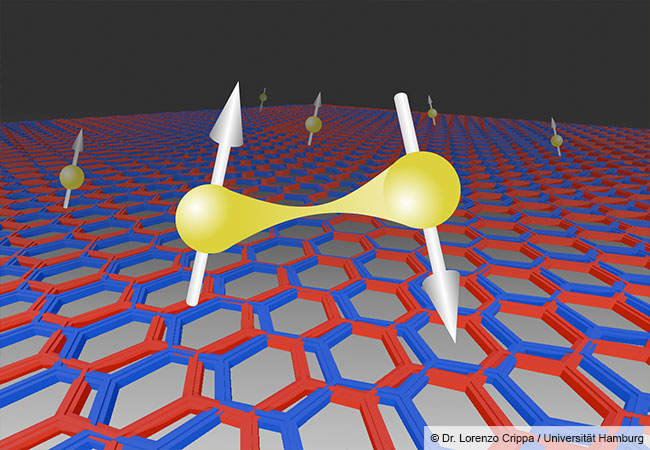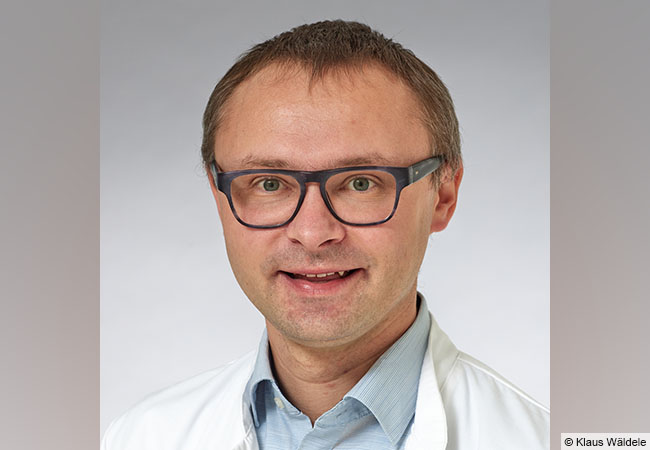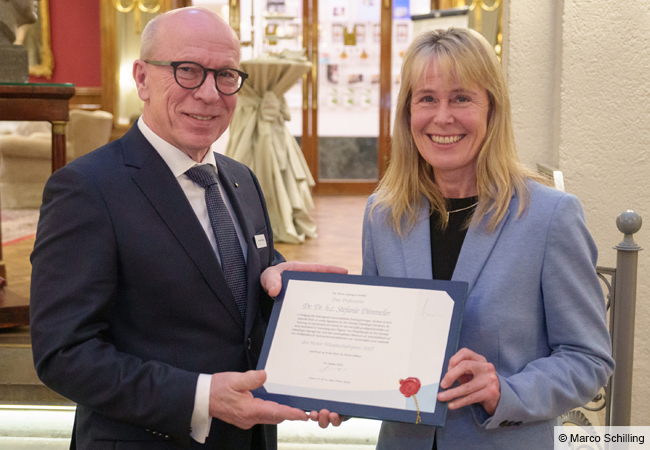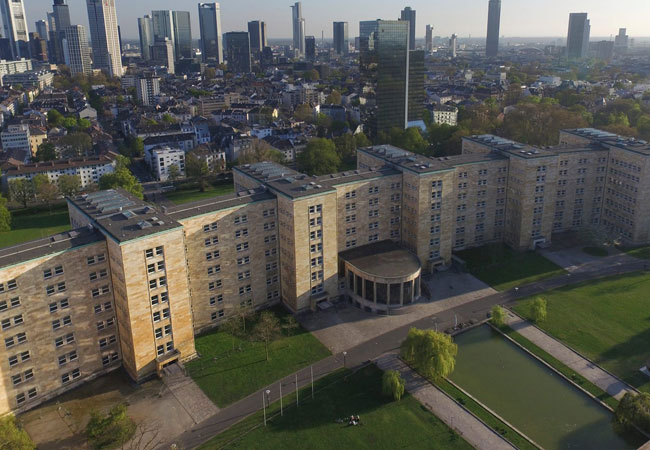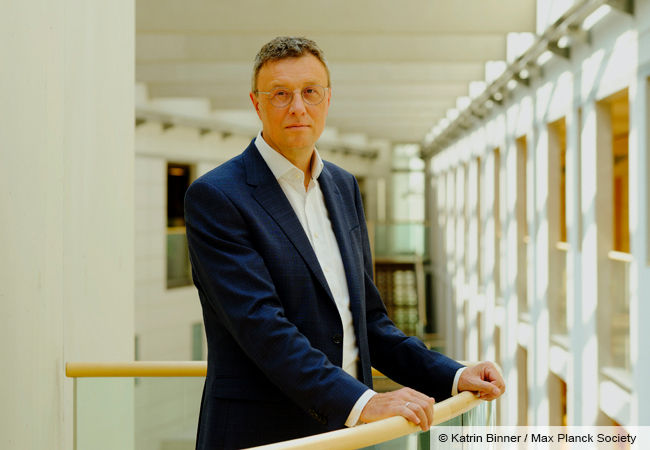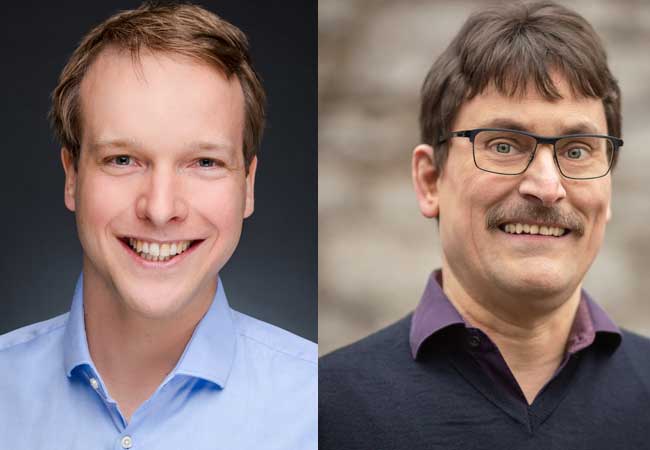
Two Goethe University physicists have been awarded high-ranking prizes by the German Physical Society. Dr. Sebastian Eckart from the Institute of Nuclear Physics has received the Gustav Hertz Prize, endowed with 7500 euros, for his contributions to fundamental questions of quantum mechanics. Professor Thomas Wilhelm from the Department of Physics Education was bestowed with the Robert Wichard Pohl Award and a prize money of 5000 Euro for his outstanding contributions to the modernization of physics education. The awards were announced by the German Physical Society (Deutsche Physikalische Gesellschaft, DPG) on November 17, 2022.
Sebastian Eckart has succeeded in conducting groundbreaking experiments in atomic physics on the shortest time scale: Using ultrashort laser fields, he was able to generate ring currents in single atoms by selectively removing electrons with a specific sense of orbit from the atom. The result was an ion with a defined ring current in which the majority of electrons orbit in one direction around the atomic nucleus. This demonstrated the possibility of storing information in individual atoms in the form of ring currents, whereby „writing“ and „reading“ occur in a few femtoseconds (one femtosecond is 0.0000000000001 seconds). In another paper, Eckart was able to measure tiny time delays – of only about 0.02 femtoseconds – of electrons emitted from molecules. In his latest work, he succeeded in creating an entangled pair of atoms within a few femtoseconds. Entanglement is a quantum effect in which particles can only be described together, even if they are at a greater distance from each other. The „spooky action at a distance“ – so coined by Einstein – can now finally be studied at the atomic level with extremely high time resolution.
How can teachers improve learning in physics lessons, from primary school to university? This question has been at the forefront of the mind of physics educationalist Professor Thomas Wilhelm for more than two decades. He has shown that the teaching concepts developed by him enable students to understand the material taught better than in conventional lessons. However, the didactic preparation of the material alone is not enough, his research shows, because it also depends on how one embeds physical terms in pupils’ everyday concepts of physics and with their way of thinking and approaching learning itself, i.e. with the „mindset“. Thomas Wilhelm has produced a number of books with teaching materials, has written several textbooks for physics teacher training programs and physics teachers, and has published a large number of practical teaching articles in teacher journals. In its tribute to the award winner, the DPG writes: „His work is characterized by a strong subject and school orientation and combines his numerous projects for the development of teaching concepts and materials well-grounded in research on physics pedagogy. His projects have a great impact on teachers and contribute significantly to the further development of physics teaching.“
Sebastian Eckart studied physics in Constance from 2009-2015 with stays abroad in Italy and Oman. He completed his master’s thesis under Professor Alfred Leitenstorfer, Chair of Experimental Physics at the University of Constance. In 2019, he completed his PhD at Goethe University Frankfurt in the group of Professor Reinhard Dörner at the Institute of Nuclear Physics. In 2020, his outstanding PhD on „Strong Field Ionization in Two-Color Fields“ received the Dissertation Award of the Association of Friends and Sponsors of Goethe University and the Institute of Physics, the main professional association for physicists in the UK and Ireland. After research stays in Berkeley and Vienna, Sebastian Eckart is now a postdoctoral researcher at Goethe University.
Thomas Wilhelm studied physics and mathematics for the grammar school teaching profession, after which he worked as a grammar school teacher in Marktbreit. In 2005, he received his doctorate from the Justus-Maximilians-Universität of Würzburg for his thesis on dynamic visualisations in mechanics. His habilitation in 2011 was on innovative video-based approaches to the analysis of motion videos. In 2012, he accepted an appointment at Goethe University, where he has since been a professor of physics education. He has received numerous prizes and awards for his research, including the Frankfurt Physics 2021 Science Prize.
The Gustav Hertz Prize recognizes outstanding, recently completed work by young physicists to encourage scientists at an early stage in their careers. The work has to come from the fields of experimental or theoretical physics, show some degree of completion, and contain new insights. In this context, „insights“ are not understood solely in the sense of fundamentals; rather, results are also valued in terms of application and practice. The Gustav Hertz Prize was created in 1992 following the merge of the Prize of the DPG – Physics Prize – and the Gustav Hertz Prize of the Physical Society of the former German Democratic Republic (GDR).
The Robert Wichard Pohl Award is awarded for outstanding contributions to physics that have a special impact on other disciplines in science and technology, for exceptional achievements in the dissemination of scientific knowledge in teaching at university, in the classroom and in physics education research.
With some 55,000 members, the German Physical Society is the world’s largest professional physics society.


